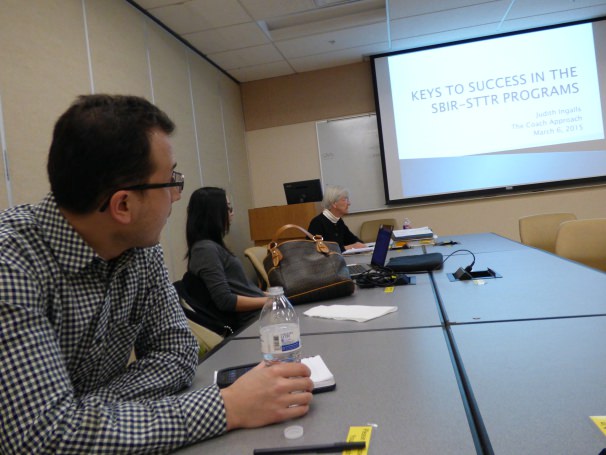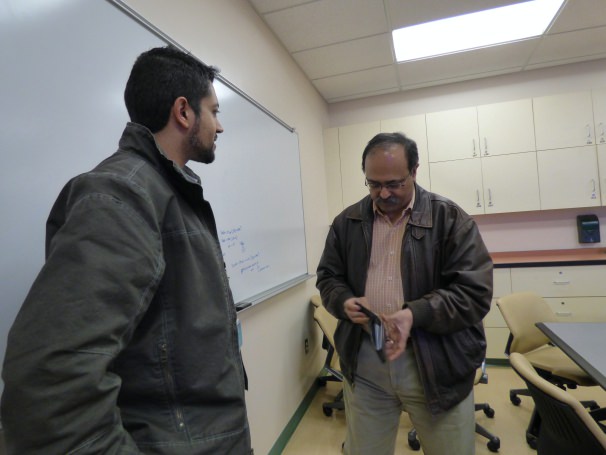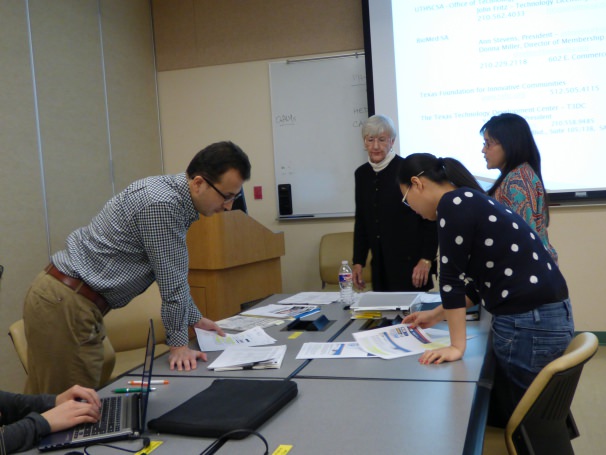Biomedical Product Development Course Connects Students to Entrepreneurs
 Students in the “Topics in Translational Medical Product Development” course are able to meet a CEO or a Vice President from different biotech
Students in the “Topics in Translational Medical Product Development” course are able to meet a CEO or a Vice President from different biotech
companies in San Antonio every week.
“The idea is to create an educational platform for students, faculty, and anyone interested on the topics of biomedical startups and entrepreneurship,” said Dr. Andrea Giuffrida, course director and vice president of research ad interim at UT Health Science Center.
Anna Mancha, a graduate student in the Cancer Biology program explained that the course is a great way for her to learn how about different ways to use her degree in addition to learning how a product goes from an idea to fruition to the market.
“We’ve seen anything from scientific liaisons to patent attorneys to people who started biotech companies, some who failed, some who flourished, and some who failed and flourished,” Mancha said. “It’s been a cool journey to see what I can do with my degree.”
Dr. Giuffrida explained that the class has strengthened our relationships with local San Antonio biotech companies.
“By involving the community, we are able to provide students with the best local experts on a subject they want to learn. These people have also been around for a long time and can provide case studies on the ins and outs of the process of developing a new drug or medical device,” said Dr. Giuffrida. “Working with us is also a good way to pick up new collaborations with the private sector, so it’s a win-win situation.”

Dr. Pratap Khanwilkar, vice president of product development at InCube Labs agreed and explained these partnerships help improve health outcomes for patients.
“Some of the research here has commercial value and we are always looking for new technologies that can become the next company. UTHSCSA researchers want to help patients and many want to see their research used in patients but you’ve got to start a company to do that. We bring the business support and collaborate with the researchers to finance and manage it so that it can get there to actually help patients,” said Dr. Khanwilkar. “It’s a long road so you need different skills along the way.”
Ahsan Choudary, a graduate student in the Translational Science Ph.D. program, explained that the class helps him think about the tools he needs in starting a biotech start-up.
“I’ve learned that there is a different mindset that is needed. You have to be good at so many disciplines besides the science portion of it,” Choudary said. “You have to understand business, you have to understand leadership skills, and not everybody can be a jack of all trades so you have to work with a multidisciplinary team to accomplish these goals.”

Choudary explained that with the decrease
in National Institute of Health (NIH) funding, he believes that more students are open to the idea that science is something that fits very well with a business model.
“When a lot of people hear about combining science and business, they think it’s terrible because they think about multi-national
million-dollar drug companies and they are thinking about the bad sides of it. What they are not thinking about is all the benefits that come with it,” Choudary said. “They are not just out there to make money, they are also pushing research forward and helping make lives better.”
Catherine Cheng, a graduate student in the Integrated Biomedical Sciences (IBMS) program, said that the class is a great way for her to network without going to a networking event.
“We all know what happens at networking events, you immediately gravitate towards the people you already know. While it’s valuable to reinforce these connections, what we need is a more representative sample,” Cheng said. “What we get through the class is a curated roster of the most influential people in the local biomedical business communityaa diverse group of professionals with very different job functions and product types and it’s unlikely that we would be able to meet all these people through networking efforts of our own.”
